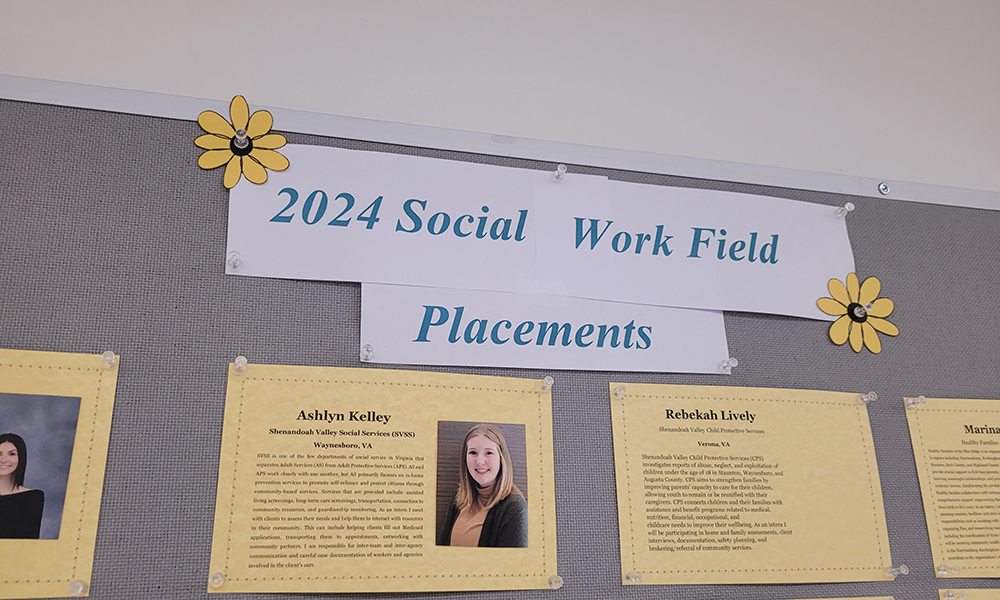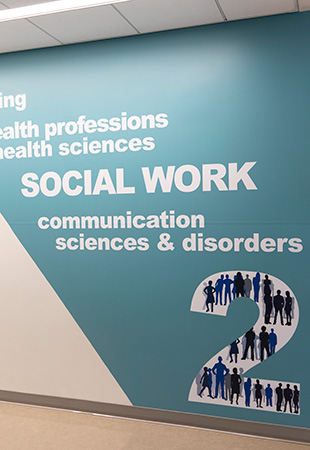Social Work field practicum prepares seniors for professional careers
News
Seniors in the Social Work major in the College of Health and Behavioral Studies spend their final semester at JMU in field placements with local agencies to develop professional skills and bridge classroom learning to hands-on experiences in their field practicum assignments.
During their field practicum, students complete 472 hours of direct practice at local agencies under supervision of a field instructor. That’s the equivalent of a part-time job averaging 30 hours per week. Along with their work in their field placement agency, students also have occasional Friday classes and assignments that facilitate their transition to professional practice and encourages reflection on their field work experiences.
There’s a wide range of agency types, according to Summer Levy, a fourth-year in the Social Work program completing her field practicum this spring. “People are in the criminal justice field, at community colleges, foster care agencies. It’s a really wide reach.”
Prior to the field work practicum, students complete 50 hours of pre-field community service. Then, students meet with Social Work faculty one-on-one to help inform placement decisions.
“It was definitely a fast transition,” said Levy, about the field practicum’s immersive approach. Students go from having classes nearly every day, as they have in previous semesters, to working in local agencies with only a few Friday class meetings in the semester. Between field practicum and assignments, Levy said she has found the program to establish a “good balance” of work and down time. “I feel like I’m practicing for the real world. It feels like I’m being prepared well.”
For her pre-field experience, Levy worked with children who have Down syndrome at Gigi’s Playhouse in Long Island, New York. She was pleased to be placed with Claude Moore Precious Time for her practicum “because I have more experience working with children with disabilities, and that’s what this program does.”
“I’m actually the first intern at Claude Moore Precious Time,” Levy said. Precious Time, a program in the Institute for Innovation in Health and Human Services at CHBS, provides respite care to the families of children with disabilities and/or special health care needs.
 “The people that actually provide the respite care are nursing students,” Levy said, “but I work behind the scenes.” Levy works to match nursing students to participating families based on the needs of the child and caretakers. She also assists in the recruiting of families and placing them on waitlist when needed. “Right now, we have 55 participating families, but that just keeps growing,” Levy said.
“The people that actually provide the respite care are nursing students,” Levy said, “but I work behind the scenes.” Levy works to match nursing students to participating families based on the needs of the child and caretakers. She also assists in the recruiting of families and placing them on waitlist when needed. “Right now, we have 55 participating families, but that just keeps growing,” Levy said.
“I recently started a support group for caregivers in our program,” Levy said. “I’m also in contact with all the families and students in case they reach out with any questions or any conflicts.”
“Being able to start this support group for caregivers and seeing how grateful they are, it really puts into perspective other populations and makes me want to work for them that much more,” Levy said. “I always knew I wanted to work with families, but I think that this has made it more specific for me that I want to work with caregivers of children with disabilities.”
Fourth-years Katryna Piccolino and Amber Currie are placed with Augusta County Public Schools, supporting students who are at risk of being chronically absent from school. At different schools throughout the county, Piccolino and Currie hold small groups with students to encourage attendance and foster “strengths-based perspectives” to help students develop long-term goals, according to Piccolino.
Piccolino served her 50 pre-service hours with Lifting Up Westchester in Westchester, New York, which is where she began an interest in working with younger populations.
“My role is to get them to think and brainstorm ideas of what they like or what they want to do when they’re older, to see the importance of why you have to come to school,” she said.
“I’m definitely enjoying it,” Piccolino said. “I [saw] I had made an impact on their lives just from the little time we’ve had together. What I’m doing now makes me excited for what I can do in the future with other people,” she said.
Piccolino has made several connections between her prior classwork and this hands-on experience. “We’ve learned how to work with different group populations based on the electives that [the Social Work program] has to offer,” said Piccolino. “We learn to work with different populations at different levels, like the micro, mezzo and macro setting. It definitely helped to run groups in our mezzo class last year.”
For Currie, her placement in Augusta County Public Schools was her first experience doing social work with children.
“Something I’ve loved about the program is that I can definitely see systems theory in place,” Currie said. “These students are part of so many systems, and how they all factor in, you see how different parts of their lives are contributing to potentially having more frequent absences.”
“I’ve learned to work with or collaborate with a variety of professionals at the school, like administrators, the school social worker, counselors, as well as teachers,” Currie said. “Interprofessional work has definitely been something the program has been good in preparing us for.”
All three students shared the sentiment that the Social Work program at JMU has prepared them for this field practicum experience, and that the experience itself will help inform and enhance their careers after graduation.
“I think the Social Work program at JMU is really unique and special,” Currie said. “I’ve been very lucky to be part of it. I’ve made some really good connections, and I’m happy working with the individuals that I am.”
“My one piece of advice to anyone going through practicum is to always have an open mind, because you might not end up where you originally wanted to be, but you’re going to make an impact anywhere,” Piccolino said.
